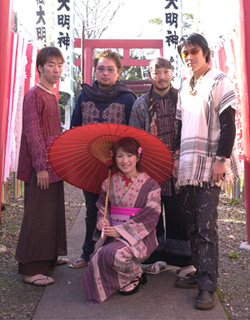 |
Chanchiki
about The band
Minyo, the Japanese folklore music, is the simple song which was naturally born from people's everyday life and has been handed down for ages. It represents various emotions of regional characteristics.
In the form of ballads for labor as rice planting or fishing, to celebrate marriages or festivals, to dance or play, for banquets, lyrics include each regional folkways and dialect, and songs have developed with various aspects of ancient life. Tsugaru-Shamisen and Okinawan music, which are well-known all over the world, came from regional characteristics as well. Minyo ismainly sung to Shamisen, and Fue( Japanese flute ), Shakuhachi ( Japanesevertical bamboo flute ), Kokyu ( Oriental fiddle ), and Wadaiko ( Japanese drum ) occasionally joininthere.
Until 1960fs, Minyo attracted widespread popularity among people of all ages and had an influence on Japanese popular music, and also many new songs of Minyo came into the world. Minyo maintained popularity and contemporaneousness at that time.
But with the change of the times, because of concentration of the population in large cities and penetration of western lifestyle and culture including music, lyrical content and the sound of Minyo became estranged from their lifestyle steadily. Nowadays except in Okinawa and a fewplaces, Minyo is performed only at local and traditional festivals, so master-and-pupil system andto maintain skill of singing and playing in an old form by preservation activity have a priority.
As the band "Chanchiki" places itself in the world of Minyo where it seems like losing inherent energy, they are one of few bands that are making a new departure in music to restore the balance between tradition and creation.
Featuring traditional singing and playing with Japanese instruments, updating the aspect of rhythm by adding a variety of percussion and freely grooving electric bass, they have incorporated Rock, Jazz, Funk, Boogie, Caribbean, Latin, African music, and etc.
On the other hand, they have visited the places where Minyo songs were born in, engaged in active exchanges with local musicians, and conducted field research. They are always conscious of respect for the root of Minyo in the conduct of composition.
Therefore by the unique way of mixture based on the accomplishment, each musical element blends, then the standard and classic Minyo songs of their repertoire sublimate to give out contemporary and firm groove rooting deeply.
Incidentally, this band derives its name: gChanchikih from a kind of metal-ashtray-shaped percussion with sticks which is also called 'Atarigane'. Nowadays it's used for local entertainment, Chindon music, and lively music for Rakugo. Needless to say, it's used effectively in this band.
The key member Tsutom Tanaka, in charge of composition, arrangement, Wadaiko and Shamisen, started his music career as a drummer in his teens with an amature band which aimed at American R&B music. At the age of 19, he was shocked by the encounter with Tsugaru-Shamisen. After he studied under the master Shuichiro Takahashi, he began his career as Shamisen player. Shortly after he found his root in Minyo, then called whiz-kid Minyo players and musicians in rock and jazz field, and formed the band "Chanchiki" in 1998.
The singer Makiko Ikeda has learned Minyo singing and dancing from the cradle and have won Minyo-singing competitions many times. The Shamisen player Hajime Nishi studied under the master of Tsugaru Shamisen, Chisato Yamada. Hajime is a unique Shamisen player performing in overseas as well as Japan. He's also enrolled in the Shamisen rock band "Musashi". The Shakuhachi player Koushi Tsukuda, whose father is also a professional player of the same instrument, has been performing since his teens, and is the skillful player supporting many Minyo musicians and touring around the world. The bass player Tacoji plays many different styles of music such as jazz, funk, rock and so on, and has unique phrasing and approaches which make up the sound of Chanchiki drastically. And in some songs, some musicians from the avant-garde jazz big band "Shibusa-Shirazu" support the band for percussion and horn section.
The band has released 2 CDs on an independent label, "DOURAKU" (that means gDissipationh) in 2000, and "GOKURAKU" (that means gParadiseh or gHeavenh) in 2004. DOURAKU has famous Minyo songs from all around Japan. In following GOKURAKU, they discovered Minyo songs which remain only in local festivals, and also picked up Japanese popular songs that has survived with Minyo in the same age. With fresh ideas, futuristic and groovy arrangement and sound processing , it shows high musical maturity over the previous one.
Besides CDs, they've offered theme songs to big festivals like Yosakoi Soran Matsuri. Those are the new Japanese festivals of competition in dancing by team. Also they perform as a main act there, and get audience into collective dance where Minyo gets back its inherent energy temporarily.
In addition to their live performance activity, they have held educational programs willingly, and joined various school events to have workshops with students.
They are having approaches in many ways to aim at the reinstatement of Minyo in the field of music and culture for the masses of Japan.
